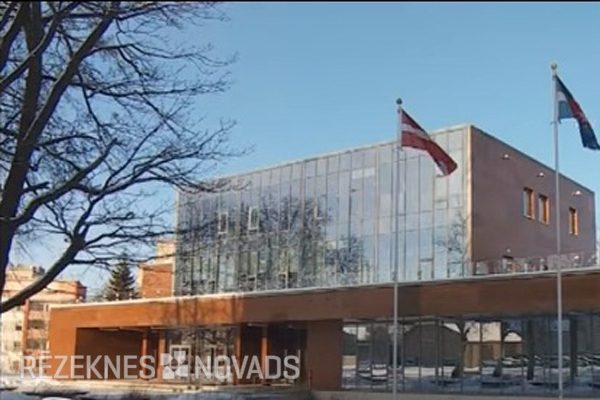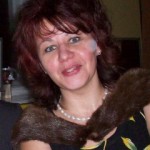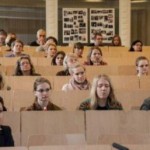Inspired story for future students of the Rēzekne Technology Academy

RA Honorary graduate Diana Bravacka: “I believe that my mission is to return the knowledge acquired to the younger generation”


Diana Bravacka at Rēzekne High School (RA) has graduated from the Latvian language and literature teacher programme, as well as the “philology” of academic bachelor studies and the “philology” of academic Masters. She works as a student of Latvian language and literature, as well as informatics teachers at the Priekuļi Basic School. In 2015, she received THE TITLE of a RA graduate.
For his choice of study, Diana says, “I learned mathematics in high school in high school, learning the basics of programming.” In high school, teachers had noticed a linguistic doorway in me, urging them to learn it. I did not want to admit it and initially chose more practical things, but... the philosophy was the area where i felt strong with the basic knowledge. When RA was opened, i was already working at school so that i could go to a higher education institution closer to my place of residence. Riga did not tempel me. But the following masters' studies were beginning to be seen in the impressions of the higher school teachers – such an insurmountable temptation to listen to I again. Sutures, O. In the binding lectures of Sibanova, A. Jusko-Schtekeles, L. Bernanes and Others. '
The knowledge obtained during the course of the studies is also useful in the work process: “the whole of the ancient time in the history of history and the modern-day.” I was the first to use and encourage others to work with computer-linguistic (Corpening) research programmes. I liked all the lecture courses. I can't kill anyone. Both Latvian and Latvian language and literature studies and THE acquisition of THE possibilities of use in the philosophy are useful. The knowledge base also allows my pupils to raise their latgalical self-awareness so as not to disappear in today's globalisation processes in the world. I teach students the latgalic script as much as possible. '
During his studies at Rēzekne High School, Diana remembers as an intensive teacher: "Because i studied at the bachelor's studio in a non-face-to-face fashion (we were the first non-professional graduates who won not only the speciality of the Latvian language and literature teacher, but also the bachelor's degree), the study process was very intense – writing articles, studying fiction, spending a lot of time in a university reading. I took the exam session as a headline - do everything at the time, do not leave debts. It was mostly successful. The teachers were demanding, but justified. The skills required to carry out scientific work were developed in me by Ineta Kristovsky, who was once angry that“ she is so much from me! ”but i am pleased. I suppose an institution of higher education is more needed to organize thinking, to teach you to see the things and relationships and the ability to“ compose everything along the shelves ”with evidence, not populism.
As the most brightest event, i thought of the spring exam session in the first year of study – while i answer teachers, my month-old son-in-law, the mate and girlfriend, at which time I lived in Rezekne. There was no easy, sometimes desperation and fatigue, but with the encouragement and support of the family, the courteous and teachers, everything succeeded. It's a spite for me now, too, and help – there'll always be a sun behind the clouds! You need to dig! '
As a teacher's work, the graduate says: "the teacher's work is not difficult when it is“ put into a cradle ”, a pleasant and all the necessary conditions. My mother also wanted to be a teacher at that time, and she had the right education, but her intention to end was in me, because that was how she taught me love for the book. I believe that my mission is to return the knowledge gained to the younger generation. Others say that's what i'm going to do. I don't see the need to learn something to get it and not share it with others
I do n't warn with pupils, take them as adults, but even in the years they can make mistakes. I do n't worry about moralization, but i'm trying to explain the information and show people's different perceptions, attitudes to it. If we really can't change anything, we'll change our attitude toward it! Everyone may have their own opinion based on their own experiences and knowledge. Students can appreciate it. I think there is no problem. '
Diana is convinced that the teacher must be honest, both for himself and for his work. “I must be able to recognise and correct my mistakes. Children need to be loved. I need to learn to learn and give knowledge. There are no other special conditions. But in this profession, you can only be happy when you feel or see the fruits of your work - feedback. And, yes, there is also a patience, because the fruit is sometimes seen after years. '
In the course of self-training, the teacher has learned the missing knowledge that allowed the requirements OF THE ECDL to be met and thus has the opportunity to teach primary school pupils as well. The class equipment is appropriate to allow the Internet to be connected to the Internet at any time or to use wider demonstration capabilities. This strongly stimulates the motivation of pupils' learning, helps to maintain an interest in learning.
Diana, both herself and with pupils, engage in various activities, projects, participate in educational seminars. She says, “If i'm honest, i don't want to look back, but when i learn from mistakes I'm accustomed to looking into the future.” I climbed into the hill. I'm not going. I am pleased with the cooperation and the existing contacts with my university, as i have also given my knowledge to teachers and adult people. The last major project was the repression of repressed persons in the Video Preiles and Rwanda District. This succeeded in time because many of the surveyed are no longer. The result of the co-operation project (“Latgale Siberian children”) is now found in the parish libraries. Hopefully the co-people are useful. The desire to know the new, unknown is somewhat inherited from the time of the studies. '
Upon receiving the title of honorary graduate, Diana felt an immeasurable joy and satisfaction: I never thought how i had treated my college and tried to promote its name in all possible ways that would be worth admiration, dignity, or even honor. It seems just right and self-evident to me. I keep going and keep doing it. '
For the future students of the Rēzekne Technology Academy, Diana said, “enjoy the time you have to study, the other so filled and you will certainly not be.” Even more confusing, if this time is in such a secure and modern environment as the Rēzekne Technology Academy. You can envy that! Ask your doctors for answers to questions of interest to you: your compass will be in your hand! It is also late for all academic staff to resist and fuel the growth of Latgale and Latvia! That's what we can do with the storms of life. '
RTA Public Relations Division